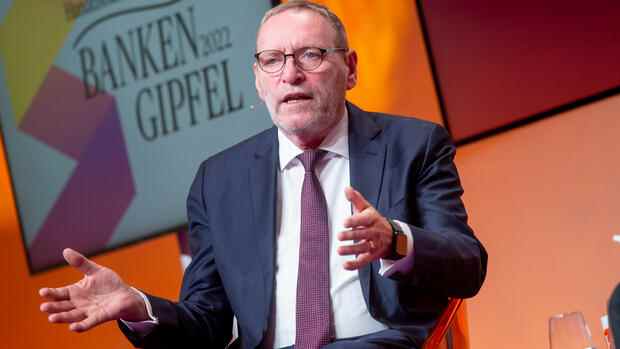The head of the Sparkasse believes: “Without saving, without certain losses in prosperity, we will not get through this winter.”
(Photo: Marc-Steffen Unger for Handelsblatt)
Frankfurt The President of the German Savings Banks and Giro Association (DSGV), Helmut Schleweis, warns of the dramatic consequences of the very high energy prices. In view of the looming economic crisis, it is to be feared that the number of private households who can no longer make ends meet “could rise to 60 percent and more,” said Schleweis at the Handelsblatt bank summit. This means that people with a net household income of 3,600 euros are also affected.
“This means that the loss of prosperity and the consumption of wealth is affecting the middle class, which was not used to claiming transfer payments and in some cases even refused it,” says Schleweis. A lot of people don’t know how to deal with it.
Schleweis did not want to rule out that the circle of those affected could increase further. “I don’t want to be a crash prophet, but the number is calculated solidly,” said the DSGV President. Because the assumptions about price increases and energy prices, on which these calculations are based, are now “far caught up” by reality.
For him, the question is how central banks, politics and society would react to this crisis. Society is facing a challenge that has never existed in the history of the Federal Republic. “I don’t think we as a society are optimally prepared for this, because we come from a time when things only went uphill,” says Schleweis.
Top jobs of the day
Find the best jobs now and
be notified by email.
“As a society, we need a certain resilience to deal with the issues that we probably won’t all like,” the head of the savings bank continued. “Without saving, without a certain loss of prosperity, we will not get through this winter.”
More on the Handelsblatt Bank Summit:
It is still unclear whether the savings banks will have to support customers again, for example by deferring interest and repayments. Schleweis said there is currently no excessive use of overdraft facilities and credit lines. Indicators such as declining deposit growth would suggest that customers need to spend their money on other things. As a group, the savings banks would prepare themselves overall for the fact that “if our help is actually required, we can react very flexibly”.
Schleweis is critical of a cap for overdraft interest: “I would classify that as symbolic politics,” he said. An overdraft interest should only be used in exceptional cases anyway. He is “not a friend of state-controlled prices because they also lead to mismanagement”. Most savings banks and credit institutions would “deal properly” with the level of their interest rates.
With a view to the necessary transformation of the economy in terms of climate change, Schleweis called for “a turning point in regulation”. On the one hand, energy-related refurbishments would be required on an “enormous scale”.
On the other hand, extra capital buffers that bank supervisors demand from banks curbed banks’ ability to lend. “There’s a certain conflict of goals,” says Schleweis.
More: Swiss-Re boss Mumenthaler: “There is no choice but to increase prices”
